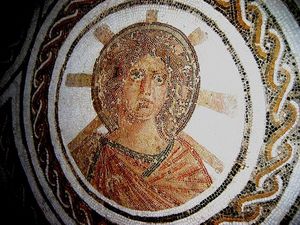In Greek mythology, Ananke ou Anagke (Ancient Greek: Ἀνάγκη, from the common noun ἀνάγκη, force, constraint, necessity), was the personification of destiny, necessity and fate, depicted as holding a spindle. She marks the beginning of the cosmos, along with Chronos. She was seen as the most powerful dictator of all fate and circumstance which meant that the other Gods had to give her respect and pay homage as well as the mortals. She was also the mother of the Moirae, the three fates who were fathered par Zeus.
According to the ancient Greek traveller Pausanias, there was a temple...
continue reading...


